Hong Kong
 From Conservapedia
From Conservapedia | Hong Kong Xiānggǎng | |
|---|---|
| Flag | Coat of Arms |
| Government | Special Administrative Region |
| Language | Cantonese, English (official) |
| Area | 426.4 sq. miles |
| Population | 7,500,000 (2020) |
| GDP | $350,000,000,000 (2020) |
| GDP per capita | $46,667 (2020) |
| Currency | Hong Kong dollar |
Hong Kong was a pocket of freedom standing up against the oppressive communist regime of the Peoples Republic of China up to 2020. The PRC calls it a Special Administrative Region. Located at the mouth of the Pearl River and formerly a British colony, Hong Kong sits opposite the former Portuguese possession of Macau. Hong Kong consists of Hong Kong island, Lamma, Lantau and various smaller islands, and Kowloon and the New Territories on the Chinese mainland. The name "Hong Kong" means fragrant harbor.
In 2019 Hong Kong was clinging to democracy against tyrannical suppression by communist China. Pro-globalist entities, like Nike, Inc., and the NBA, favor China for financial gain. In 2020, the CCP violated and abolished the international peace agreement guarantying Hong Kong's democratic sovereignty, and brought the formerly free people under control of the oppressive socialist and communist slave system.
From 1841 to 1997, it was a British colony and the main trading base for the British Empire in Asia. Despite being handed back to China in 1997, it has remained autonomy under "one country, two systems" and being an SAR status. There was a free press but no democracy and no real elections; all major government decisions are made by the government of China.
The population of Hong Kong is about 7 million people. The largest urban areas are Kowloon (population 2 million), Central, Tsuen Wan and Sha Tin. Property prices in Hong Kong's Central District are the second most expensive in the world, after those of central Tokyo.
Contents
People[edit]
| Hong Kong | |||||||||||
|---|---|---|---|---|---|---|---|---|---|---|---|
| Chinese | 香港 | ||||||||||
| |||||||||||
Hong Kong's population has increased steadily over the past decade, reaching about 6.92 million in 2007. Hong Kong is one of the most densely populated areas in the world, with an overall density of some 6,250 people per square kilometer. Cantonese, the official Chinese language in Hong Kong, is spoken by most of the population. English, also an official language, is widely understood, being spoken by more than one-third of the population. Every major religion is practiced freely in Hong Kong. All children are required by law to be in full-time education between the ages of 6 and 15. Preschool education for most children begins at age 3. Primary school begins normally at the age of 6 and lasts for 6 years. At about age 12, children progress to a 3-year course of junior secondary education. Most stay on for a 2-year senior secondary course, while others join full-time vocational training. More than 90% of children complete upper secondary education or equivalent vocational education.
- Population (mid-2007): 6.92 million.
- Population growth rate (2006): 0.6%.
- Ethnic groups: Chinese 95%; other 5%.
- Religions: About 43% participate in some form of religious practice. Christian, about 9.6%.
- Languages: Cantonese (a dialect of Chinese) and English are official.
- Education: Literacy—97.1% (98.7% male, 95.4% female).
- Health (2006): Infant mortality rate—1.8/1,000. Life expectancy—82.6 yrs. (overall); 79.5 yrs. males, 85.6 yrs. females.
- Work force (2007): 3.65 million. Wholesale, retail, and import/export trades and restaurants and hotels—28.8%; finance, insurance, real estate, and business services—13.8%; manufacturing—4.3%.
The arts[edit]
Hong Kong has the world's third largest film industry after Bollywood and Hollywood. Most films are produced in the Cantonese language, although a few Hong Kong stars, such as Jackie Chan are known internationally.
Government and political conditions[edit]
The political conditions in Hong Kong formerly differed from that of the Chinese mainland due to the history of British colonialism. Hong Kong maintained a British colony for 156 years until 1997, whereby it was handed to China under the "one country, two systems" policy formulated by Deng Xiaoping and Margaret Thatcher in 1984. This policy supposedly means that classical liberal freedoms such as the rule of law, freedom of speech, economic freedom.
In 2020 the Hong Kong Special Administrative Region (SAR) was headed by Chief Executive Carrie Lam, who first took office in 2017. The Election Committee that votes on the Chief Executive (CE) is made up of approximately 800 Hong Kong residents from four constituency groups: commercial, industrial, and financial interests; professionals; labor, social services, and religious interests; and the legislature, the Chinese People's Political Consultative Conference, and the P.R.C. National People's Congress.
In July 2002, the Hong Kong Government implemented the Principal Officials Accountability System, which was designed to make the government more responsive to public concerns. Twelve political appointees, directly responsible to the Chief Executive, run the 12 policy bureaus. Three other senior civil service positions—the Chief Secretary, Financial Secretary, and Justice Secretary—are also filled by political appointments.
While Hong Kong remains a free and open society where human rights are respected, courts are independent, and there is well-established respect for the rule of law, residents are limited in their ability to change their government, and the legislature is limited in its power to affect government policies. The September 12, 2004 Legislative Council (Legco) elections were seen as generally free, open, and widely contested, although Hong Kong groups have alleged voter intimidation, manipulation, or pressure in connection with them.
In December 2005 the Legco rejected a Hong Kong Government-proposed package of incremental reforms to the mechanisms for choosing the CE in 2007 and forming the Legco in 2008. In July 2007, the Hong Kong Government's Commission on Strategic Development issued a Green Paper on Constitutional Development, which set out a myriad of options to reform the CE and Legco electoral mechanisms, with the "ultimate aim" of universal suffrage as prescribed by the Basic Law.
On December 12, 2007, former Chief Executive Donald Tsang submitted a report on the Green Paper to the central government. The report said more than half of local people wanted universal suffrage by 2012, but 2017 might be a more realistic date. In December 2007, the P.R.C. National People's Congress Standing Committee (NPCSC) issued a decision on Hong Kong's constitutional development which, while ruling out universal suffrage in 2012, appears to open the way for Hong Kong to achieve full universal suffrage for the CE in 2017, and full universal suffrage for Legco sometime thereafter. Any amendments to the Basic Law will require approval by the CE, at least two-thirds of Legco, and then the NPCSC.
In 2011- 2012, the government tried to implement National Education in Hong Kong but failed due to protests. While it may sound good to a Conservative American, it has a bias slant towards China as it is missing key points in Chinese history like the June 4th incident.
On June 1, 2012, Chief Executive Leung Cheng Ying replaced Donald Tsang as Chief Executive.
On September 28, 2014, police fired tear gas onto unarmed protesters that occupied major roads in the city centre. The protests were commonly known as the Umbrella Movement. The protesters were fighting for basic Universal Suffrage instead of SAR government's view of democracy which selects pro Beijing candidates by using the election committee consisting of 1200 mostly pro Beijing citizens in Hong Kong. Instead of ending the protests, the protests spread to other areas of Hong Kong including Mongkok, a place known for shopping and triad/ gang activity, Tsim Sha Tui, a shopping and tourist district and Causeway Bay, the Hong Kong version of the New York Times Square. The protests ended on December 15, 2014, due to the lack of support from the Hong Kong public, failed tactics and police clearance of the streets.
In 2019, Hong Kong was besieged by protests of hundreds and thousands of people against an extradition bill. Opponents of the proposed law claim that it violates the "one country, two systems" policy, and that such extradition would allow political opponents to be extradited to mainland China, where their rights are not protected to the same level as in Hong Kong, citing arrests from the 2014 protests as precedent.[2]
Hong Kong's foreign relations and defense are the responsibility of China. Hong Kong was an independent customs territory and economic entity separate from the rest of China up until 2020, and was able to enter into international agreements on its own behalf in commercial and economic matters. Hong Kong, independently of China, formerly participated as a full member of numerous international economic organizations including the World Trade Organization (WTO), the Asia Pacific Economic Cooperation forum (APEC), and the Financial Action Task Force (FATF).
National Security Service[edit]
The National Security Service of the Hong Kong Police Force arrested five officers of the General Union of Speech Therapists on July 22, 2021. Those arrested included the chairman, deputy chairman, secretary, and treasurer on the pretext of breaching the National Security Law. The five are accused of conspiring to print seditious publications — children’s cartoon books. Approximately 550 related publications and a batch of leaflets were seized in the operation, and the union’s bank account frozen.
The National Security Service accused the books of vilifying the government and provoking hatred. Three cartoon books under suspicion were Guardians of the Sheep Village, The Twelve Warriors of the Sheep Village, and The Sheep Village Scavengers. Sources say Guardians of the Sheep Village tells about two villages, one of whom lived with “good sheep” and the other with the “evil wolf.” One day, the wolves took advantage of the shepherd’s departure, pretended to be sheep, mixed into the sheep village, and promulgated the “Wolf and Sheep Rules.” It stipulates that the wolves could hunt the sheep at will, and the sheep rebelled. At the end of the book, it asks the reader: “If you are a sheep, would you continue to guard your home bravely?” The book also includes a timeline of the Anti-Extradition Law Amendment Bill (Anti-ELAB) movement, and indicates the corresponding page number for the story.
According to reports, Guardians of the Sheep Village, published in June 2020, is based on the Anti-ELAB. The book mentions that the wolves hope to occupy whole villages and eat the sheep. The Twelve Warriors in Sheep Village, published in September 2020, is based on 12 Hong Kong residents detained at the Yantian Police Station in Shenzhen, China. The Sheep Village Scavengers, published in March 2021, describes the situation of healthcare workers who went on strike in February 2020.[3]
Economy[edit]
Hong Kong is one of the world's most open and dynamic economies. Its per capita GDP is comparable to other developed countries. Real GDP expanded by 6.8% in 2006 year-on-year, driven by thriving exports, vibrant inbound tourism and strong consumer spending. Severe acute respiratory syndrome (SARS-CoV-1) caused the Hong Kong economy to shrink during the first half of 2003, and property prices had fallen 66% from their late 1997 peak, but have since rebounded by about 84% from that lower base. The unemployment rate declined to 3.6% in September–November 2007, the lowest level since mid-1998. The surplus for fiscal year 2007-08 was $7.5 billion or 4.0% of GDP, attributed to the robust economy, increased corporate profits and salaries, the buoyant stock market, and a stable property market.
Hong Kong enjoys a number of economic strengths, including accumulated public and private wealth from decades of unprecedented growth, a sound banking system, virtually no public debt, a strong legal system, and an able and rigorously enforced anti-corruption regime. The need for economic restructuring poses difficult challenges and choices for the government. Hong Kong is endeavoring to improve its attractiveness as a commercial and trading center, especially after China's entry into the World Trade Organization (WTO), and continues to refine its financial architecture. The government is deepening its economic interaction with the Pearl River Delta in an effort to maintain Hong Kong's position as a gateway to China. These efforts include the conclusion of a free trade agreement with China, the Closer Economic Partnership Arrangement (CEPA), which applies zero tariffs to all Hong Kong-origin goods and preferential treatment in 27 service sectors. Hong Kong, along with the Macau SAR, is also participating in a new pan-Pearl River Delta trade bloc with nine Chinese provinces, which aims to lower trade barriers among members, standardize regulations, and improve infrastructure. U.S. companies have a generally favorable view of Hong Kong's business environment, including its legal system and the free flow of information, low taxation, and infrastructure. The American Chamber of Commerce's annual business confidence survey, released in December 2007, showed 99% of respondents had a "good" or "satisfactory" outlook for 2008. Survey results indicated a positive economic outlook through 2010.
On the international front, Hong Kong is a separate and active member of the WTO and the Asia Pacific Economic Cooperation (APEC) forum, where it is an articulate and effective champion of free markets and the reduction of trade barriers. Hong Kong residents across the political spectrum supported China's accession to the WTO, believing this would open new opportunities on the mainland for local firms and stabilize relations between Hong Kong's two most important trade and investment partners, the United States and China.
- GDP (2006): $188.8 billion.
- GDP real growth rate (2006): 6.8%.
- Per capita GDP (2006): $27,600.
- Natural resources: Outstanding deepwater harbor.
- Industry: Types—textiles, clothing, electronics, plastics, toys, watches, clocks.
- Trade: Exports--$315.5 billion: clothing, electronics, textiles, watches and clocks, office machinery. Imports--$333.3 billion: consumer goods, raw materials and semi-manufactures, capital goods, foodstuffs, fuels.
Transportation[edit]
Most public transport inside Hong Kong is provided by a company called the MTR Corporation which is mostly owned by the Hong Kong Government while the part that the government does not own is listed on several stock exchanges such as the SEHK. The MTR operate all metro/subway services, commuter railway services as well as owning most property inside Hong Kong alongside a few bus services which connect to their metro services. The MTR being mostly owned by the HK Government is why Hong Kong Protestors started vandalising metro stations as they closed stations in areas that the protests were taking part in.
Bus Services[edit]
Bus services are operated by:
- Kowloon Motor Bus company (KMB)
- Citybus, Long Win Bus Company
- New First World Bus (NFWB)
- New Lantao Bus company
All these bus operators run franchised routes and are regulated by the Hong Kong Government as well as accepting the Octopus Card, a smartcard introduced into the Hong Kong market in the 1990s which is similar to London's Oyster Card and The Key smartcard operated by the Go-Ahead Group. The Octopus card can also be used outside of Public transportation inside Hong Kong such as in a convinience store.
There are also "Light Buses" which operate in Hong Kong; these are small vans converted to passenger use which operate on services with no route numbers and sometimes without bus stops operating like a "hail and ride" bus service where the bus will stop on the side of the road where there may be no physical bus stop or road markings.
Most buses inside Hong Kong are built by British Manufactures Alexander Dennis Limited (ADL) whicch is owned by the NFI Group of the USA and Wrightbus which is owned by JCB. Other buses such as those operated by the MTR are built by MAN which is owned by the Volkswagen Group and in recent years a large influx of buses built by Chinese companies such as Build Your Dreams (BYD) have also entered Hong Kong's streets.
Tramways[edit]
The Hong Kong Tramways is one of the oldest tramways in the world still operating via its original routing untouched in the 1940s-1970s decline of tramways and trolleybuses throughout the world, as well as being one of the oldest tramways in Asia with one of the other oldest tramways in Asia being operated by the Callcutta tramways company (CTC)in India. The Hong Kong Trams are currently operated solely by Double Decker trams which is one of the only places left in the world operating with DD Trams with the other place left being Blackpool in England.
There are also 2 Funicular tramways which are the:
- Peak Tram - this serves the mountinous areas of Hong Kong Island
- Ocean Express - this runs entirely within the "Ocean Park" theme park.
Ferries[edit]
There are also several ferry services which operate within British Hong Kong as well as travelling between mainland China and Portuguese Macao.
Highways[edit]
There are also several highways within Hong Kong as well as a somewhat newly opened highway linking Macao, Hong Kong and Mainland China; its construction resulted in several thousands of deaths and requires you to change what side of the road you drive on twice as Hong Kong and Macao have the drivers seat on the right side of the vehicle while Mainland China has its drivers seat on the left side of the vehicle.
Cable Cars[edit]
There are also 2 cable car systems inside Hong Kong, one operates within the "Ocean Park" theme park while the other operates on Lantau Island.
History[edit]
When British merchants were forced out of Canton in the 1820s, they began to use Hong Kong harbor for anchorage and storage depots. Hong Kong, with a population of 3600 villagers and 2000 fishermen, came under British control by the Convention of Chuenpi, a treaty with China in 1841, as part of the British conquest during the opium wars British foreign minister Lord Palmerston contemptuously dismissed the place as "a barren island with hardly a house upon it." Its prized harbor was used only by fishermen, pirates, and opium smugglers. However, it soon became a key and Royal Navy coaling station.
By the Treaty of the Bogue (Humen) in 1843, Chinese merchants based in the mainland were allowed free access to Hong Kong for trading purposes. By 1851 the population reached 32,000 (95% Chinese), The Second Anglo-Chinese War (1856–58) resulted in another British victory and led to the secession of the Kowloon Peninsula. Under a convention signed in Peking in 1898, the New Territories — comprising the area north of Kowloon up to the Shum Chun (Shenzhen) River and 235 islands—was leased for 99 years, primarily to forestall French or Russian occupation.
Business[edit]
In the 19th century the British colony was chiefly a naval base and as an entrepôt for trade with the mainland. An international business community grew up; Warren Delano, Jr., grandfather of President Franklin Delano Roosevelt, worked in Hong Kong in the 1860s as a partner in the American trading firm of Russell and Company. Jardine Matheson, founded in 1832, was a British partnership that did marketing for correspondent merchants in Britain, India, and parts of south-east Asia. It became active in finance, insurance, and shipping, but its most profitable commodity was opium, which was sold, illegally, in Canton and along the coast of China. In 1843 it moved its headquarters to Hong Kong, signalling the new base for British merchants, who dominated the international trade of south China. They sent teas and silks to Europe, and imported coal, machinery, metals, wines, and liquors. In 2007 Jardine Matheson had revenues of US$32 billion, and is the largest employer in HKSAR after the government.[4]
Shortages of arable land, fresh water, forest and mineral resources, and skilled labor appeared to be insuperable barriers to the development of industry. However, Chinese businessmen by the 1880s were creating a distinct cultural-historical role for the colony. They contributed to China's nation-building effort by providing financing and imports China could not secure on its own. Their success made Hong Kong a valued member of the British Empire. By 1900, the colonial government appreciated the Chinese businessmen as more than profit-bound sojourners, but as allies in the struggle for order and stability, not just in Hong Kong and in south China, but in the British empire in Asia. Nationalism does not inevitably pit colonized against colonizers, for Chinese nationalism did not drive the Chinese merchants and intellectuals into opposition; the ideal of a powerful, modern China united them with the British, for both parties realized a strong, modern China meant a commercially vibrant China.
The Chinese nationalists played a major role in service to the Qing dynasty and the succeeding Republican governments, in leading the 1911 revolution and becoming a strategic a haven for Chinese refugees. Hong Kong's philanthropic and relief works, and the commercial and industrial activities of the entrepreneurs were role models for South China. The Chinese business community in Hong Kong, resembled the British business communities there and in Shanghai, which was larger and commercially more important before 1948. Both British and Chinese businessmen were dedicated to opening markets in China, to the point at which Hong Kong Chinese were in a sense both colonized and colonizers. Both groups benefited from their connections in the British Empire, and both were dependent on its power. Members of both societies saw themselves as permanent residents rather than as expatriates or sojourners, but they also continued to send money home to support philanthropic causes and, when necessary, to assist national war efforts. Both British and Chinese could have a number of identities: British or Chinese, imperial, national, and local. Both communities based their local identities on self-images of industriousness, entrepreneurship, and public spirit. London refused demands by British residents for self-government, arguing that saying the 98% Chinese majority would be subject to the control of a small European minority.[5]
Modernization proceeded rapidly, with the Hong Kong and China Gas Company starting in 1861, the Peak Tram in 1885, the Hong Kong Electric Company in 1889, China Light and Power in 1903, the electric tramways in 1904 and the Kowloon-Canton Railway, in 1910. Successive reclamations began in 1851 — notably one completed in 1904 in Central District which produced Chater Road, Connaught Road and Des Voeux Road; and another in Wan Chai between 1921 and 1929.
A representative leader was Sir Kai Ho Kai, (1859-1914), barrister, physician, reformist, revolutionary and essayist. His grandfather was a Protestant printer in Malacca (Malaysia); his father was educated at the Anglo-Chinese College in Malacca and became a Protestant minister in Hong Kong as well as a rich real estate entrepreneur. Ho Kai was one of the first Chinese physicians to be professionally trained in Britain (at Aberdeen University), becoming a central figure in the history of Western medicine in China. His public service on Hong Kong's appointed Legislative Council from 1890 to 1914, his role in helping to found the Tung Wah Hospital, Alice Memorial Hospital, the Hong Kong College of Medicine and the Po Leung Kuk orphanage; he wrote numerous essays on governmental reform.[6]
Education and religion[edit]
Schooling was not compulsory but the colonial government began annual cash grants in 1847 to schools for the Chinese; there was never any effort to impose English. In 1873, the annual grants were extended to voluntary schools operated by Christian missionaries. College of Medicine for the Chinese, opened in 1887 with Sun Yat Sen as one of its first two students; it became the University of Hong Kong in 1911 and built arts, engineering and medical faculties. However, throughout the 20th century higher education opportunities were limited.
The Church Missionary Society of the Church of England promoted work in China after 1844. George Smith (1815–1871) was the first bishop of Hong Kong, 1850–64. Smith handled Anglican pastoral and missionary, and directed St. Paul's Missionary College (now St Paul's Boys' School). He spoke Chinese and conducted both Chinese and English services. Smith set up the first mission to seamen in Hong Kong and was president of the Bible Society in Hong Kong. He ordained the first two Chinese deacons in 1863. The governor appointed Smith as chairman of the education committee in 1852 and of its successor, the board of education, in 1860.[7]
Frederick Stewart (1836–1889), the first head of the government education department was a Scottish Presbyterian educator who helped structure the educational system 1862–1878. Most residents were too poor to educate their children: school attendance among the farming and large transient fishing communities was irregular and Chinese girls generally were not educated. Stewart passionately valued education for individual fulfillment and only secondly for society's needs. He established, developed, and managed both a school and a system, learning and using spoken Cantonese and written Chinese in his work. In 1873 he established a successful grant-in-aid scheme for non-government schools (generally warmly supported by missionaries) and saw a sharp increase in attendance. In 1889 he supported a successful initiative to extend government Western education taught through English to Chinese girls. His work was enthusiastically supported by the governors Sir Richard MacDonnell and Sir Arthur Kennedy, but his work was obstructed by John Pope-Hennessy, governor 1877–1882. Pope-Hennessy, a highly controversial Irish Catholic hostile to Protestants, favored the Chinese over the British, and faulted the English-language achievements of Stewart's Central School pupils and disapproved of the dual curriculum which was the school's unique and particular strength. Although language policy had been a source of controversy at various times during the 1860s and 1870s, it was not until Pope-Hennessy's raised the issue that conflict over the roles of English and Chinese in the colony's education system came fully into the open.[8] In 1883, on the initiative of the Colonial Office, and under a new governor, Sir George Bowen, he was appointed registrar-general and protector of Chinese. In 1887 Stewart was appointed colonial secretary—the head of the permanent civil service—and he occasionally acted as governor. Through his work in setting up a government education system which accommodated the best of two cultures—English and Chinese languages, Western and Chinese curricula, and modern and traditional pedagogies—Stewart made a lasting impact which accelerated the modernization of China. His own educational example, the pedagogical materials he produced, and his graduates all were important. Bilingual and bicultural pupils from the flagship Hong Kong Government Central School for Boys staffed many Hong Kong and imperial institutions; many attended the Hong Kong College of Medicine for Chinese, of which Stewart was the first rector. Several won positions of influence in the imperial Chinese or Hong Kong colonial governments; others, admiring Western ideals, became revolutionaries, most notably Sun Yat Sen, the first president of China.[9]
Great Depression[edit]
In 1932, facing a worldwide Great Depression and higher tariffs from the United States, the British Empire decided at the Imperial Economic Conference to protect industry and agriculture in the Empire by raising tariffs on imports from outside the Empire and encouraging colonial entrepreneurs. Since Hong Kong was a free port with no customs duties on imports or exports, industrialisation there was different than in other British colonies, where industry could only be established with the aid of protective tariffs and other government assistance, and where manufactured goods could only be sold in local markets. Hong Kong's industrialization rapidly expanded thanks to the new preference for goods made inside the Empire, and especially to the higher tariffs on Japanese textiles, footwear, and other goods. Chinese entrepreneurs in Hong Kong soon took over from the Japanese as the main competitors of British manufacturers in textiles and rubber footwear. The local and regional market expanded, with 24,000 ocean-going ships clearing the harbor in 1939. The large-scale relocation of industrial enterprises from mainland China began in the late 1930s, and resumed after the war.[10]
Second World War[edit]
London realized it could never defend the isolated colony against Japan, but had to send forces to maintain imperial prestige. Indian and Canadian troops were sent in 1941 but they lacked training, equipment, and ammunition. They served a sacrificial role, with 6500 imprisoned for the duration, while British Commonwealth forces sought a major victory in North Africa. Refugees pured in from the mainland pushing the population well over one million, with extremely crowded conditions. Japan ruled from December, 1941 to September 1945, a time of hyperinflation and food shortages. Upwards of half the population left for the mainland.[11]
Social trends[edit]
Open currency markets and a free trade policy in Hong Kong after World War II gave it great economic advantages over Shanghai, whose government-controlled import-export trade could not compete with the British colony. In the late 1940s thousands of businessmen and professionals from Shanghai and other cities fled to Hong Kong top escape the imminent takeover of China by the Communists.
Despite a low birth rate, Hong Kong's population grew rapidly after 1945, as it became a base for entrepreneurs and a haven for refugees from poverty, war and Communism in China. The population tripled from 600,000 in 1945 to 1.8 million in 1948, then grew to 4 million in 1970 and 5.6 million in 1997. Steady growth continues, reaching 6.9 million in 2006.
The colony's strong high school system produced some of the professionals and skilled workers who contributed to rapid economic development after 1945, but they were outnumbered by new arrivals from China. Hong Kong's open and competitive employment system offered an important channel for upward social mobility, which tended to forestall a growth in class consciousness. Graduates joined an English-speaking elite and took pride in its acquaintance with the British culture. This elite was then incorporated by the British Establishment. This integration reduced potential friction between the colonial government and the local elite, who displayed far less antagonism or demands for independence than elites in other colonies. Demands for political participation emerged in the 1970s, as the colonial government vastly expanded its social service commitments. Its policy of "administrative absorption" encompassed more elites from all social strata. Its image was also improved by attempts to be a "government by consultation," while the threat of a takeover by Communist China undercut demands for autonomy. Economic development consistently raised the people's living standards and lowered their demand for political participation. Hong Kong elites were proud of not being affected by the "British disease," the symptoms of which included too much social welfare, militant trade unionism, frequent labour disputes, and a decline in economic competitiveness, as affected Britain itself in the 1970s. Radical ideologies were unattractive to the community and the Maoist factions gained little support. After 1984 both Britain and China promised more democracy, but as of 2008 there still is little of it.[12]
Economic boom[edit]
In the 1950s, Hong Kong viewed Guangdong on the mainland as its economic past: an underdeveloped hinterland of cottage industries and peasant agriculture. Guangdong, meanwhile, looked on Hong Kong as its political past: a territory oppressed by colonialism. That is, Hong Kong leaders saw Guangdong as socialist, planned, unfree, and poor. Meanwhile, the Commuist leaders in Guangdong saw Hong Kong as colonial, exploitative,class stratified, and dehumanizing.[13]
The colony experienced some of the highest economic growth rates in world history during the last half of the 20th century. In the 1960s its average annual rate of growth was 13.2%, setting a world record. New factories opened, especially textiles and plastics. A major construction boom continued almost non-stop. In the 1960s the port became as a major center for world trade, exceeding all of China by 30%. It became a major international financial center. Low taxation, a strong currency, and a free currency exchange attracted international banks and foreign investment, although uncertainty regarding the 1997 takeover sent some investors to Canada. In the 1970s the growth rate slowed to a very high 8% annually. Per capita income soared, despite the fast growing population, and was the third highest in Asia by 1980, albeit less than half that of Japan.
In 1971 the colonial government made education compulsory and virtually free. Total school enrollment in 1981 was 1,339,000, but included a mere 16,000 full-time higher education students. In 1989 Governor Edward Youde moved to expand and strengthen higher education in response to public demands. He envision the founding of a world class university, an Asian equivalent of the Massachusetts Institute of Technology. In 1991 the colony established the Hong Kong University of Science and Technology (HKUST). More expansion took place in the 1990s, resulting in nine major centers of higher education, with enrollment expanded by 50%.[14] By 2006 the most prestigious school, the University of Hong Kong, had 11,600 undergraduates, 7,900 postgraduates, and 2,000 MPhil and PhD students.
1997[edit]
When Britain turned Hong Kong over to China in 1997 it was the most modern colonial metropolis in the world, where robust entrepreneurship flourished under a British legal system providing a high degree of civil liberties for its citizens, but which had never set up a democratic system. Between 1960 and 1982, Hong Kong showed the staggering average growth rate of 7.0% per year, then held at 6.7% annually to 1992. In 1995, Hong Kong's GDP per person (in parity purchasing power) was the third highest in the world.
In 1997, at the end of the 99-year lease, the whole of the Hong Kong territory was returned to China. A "one country, two systems" model for 50 years was promised by China's leader Deng Xiaoping, and the formula was accepted by Britain. Beijing selected the Basic Law Drafting Committee in 1985, making it clear it placed top priority on the stability and prosperity of the territory and that radical political reforms would be unlikely. Of the 59 members there were 23 members from Hong Kong, most of them prominent businessmen and leading professionals. The interests of the Establishment in Hong Kong apparently were assured, as the Chinese authorities were keen to retain Hong Kong's attractiveness to investors. The Basic Law Drafting Committee favoured an "executive-led" system of government for the future HKSAR with power concentrated in the hands of the Chief Executive, rather than the weak Legislative Council.
The 1985 elections to the colonial Legislative Council involved representation of different interest groups; there were a mere 70,000 eligible voters, of whom only 25,000 voted.The September 1985 elections to the Legislative Council were based on the electoral college, comprising members of the District Boards, the Urban Council and the Provisional Regional Council, and the functional constituencies.[ 10] Qualified voters therefore only numbered about 70,000 and those who actually voted amounted to about 25,000.
To rule after 1997 China created its first Special Administration Region, and as a result, Hong Kong became largely autonomous with its own government and laws, distinct from that of the rest of the People's Republic. All final decisions, however, were made by the government of China, but the influence was light-handed and "soft" before 2003.[15]
Democratic issues[edit]
On 1 July 2003, over half a million Hong Kong citizens staged a mass protest against the poor governance of the post-handover SAR government. The grievances of the marchers quickly snowballed into a widely backed movement for democracy, and another large rally was held on 1 July 2004. The landslide support for pro-democratic candidates during the local elections held on 23 November 2003 unnerved Beijing over its possible loss of control over Hong Kong. The government of China quickly shifted from a soft-line approach that talked about virtual autonomy to a hard-line approach, attempting to dampen the local democracy movement. Beijing banned universal suffrage for the elections of a Chief Executive in 2007 and a legislature in 2008. There were five fundamental causes of Hong Kong's broad-based demand for full democracy. First economic uncertainly rose sharply after 1999, as the competitiveness of the Hong Kong economy slipped and the transition to a knowledge economy was hindered by stagnant rates of university attendance. Secondly, the level of economic inequality increased,[16] along with a sense that cronyism was rampant and getting worse. Thirdly the government deficit has soared, leading to cutbacks in government services; by 2003 the government had spent half the financial reserves left by the British, and sold land assets to cover the deficit. At a deeper level citizens are anxious about their lack of voice in an authoritarian polity.[17] The The fifth fundamental problem was the failure of the new "Principal Officials Accountability System" and the growth of popular distrust towards the non-democratic system.[18]
In September 2008, "pandemocrats" as they call themselves, retained the voters’ support during the Legislative Council election. Beijing's interferences with the elections, though less blatant than those of 2004, unmistakably cast doubt on its sincerity to implement democracy in Hong Kong by 2020. In 2008, Beijing promoted a new wave of pro-Beijing professionals with a stronger and more independent image. The sudden rise and stunning electoral victories of the Social Democrats, who are hallmarked by civil disobedience on behalf of democratic and social reforms, reflect a deepening sense of public despair about the futility of the current political system, and a proliferating radicalism. A decade after the handover of their city to China, Hong Kong's "pandemocrats" remain able to stand their ground at the ballot box.[19]
Hong Kong saw massive protests in 2019 – dwarfing previous protests – over an extradition bill that would have reduced the city's autonomy and freedoms. In November 2019, pro-democracy activists saw major victories in the city's district council elections, which saw massive turnout.[20]
China has promoted mass migration to Hong Kong in order to reduce the territory's sense of having an independent identity from China.[21] By 2019, the country had shown it did not intend to honor the 1997 agreement between it and the UK.[22]
Bibliography[edit]
- DK. Eyewitness Top 10 Travel Guides: Hong Kong (2002) excerpt and text search
- Michelin Guide Hong Kong and Macau (2009) excerpt and text search
- Frommer's Hong Kong by Beth Reiber, (2007) excerpt and text search
- Stone, Andrew. Lonely Planet Hong Kong & Macau City Guide (2008) excerpt and text search
- Culture Shock! Hong Kong: A Survival Guide to Customs and Etiquette by Betty Wei and Elizabeth Li (2008) excerpt and text search
History[edit]
- Carroll, John M. A Concise History of Hong Kong (2007) 270 pages excerpt and text search
- Chiu, Stephen, and Tai-Lok Lui. Hong Kong: The Global City (2009) excerpt and text search
- Fu, Poshek, and David Desser. The Cinema of Hong Kong: History, Arts, Identity (2008) excerpt and text search
- Ingham, Michael. Hong Kong: A Cultural History (2007) excerpt and text search
- Tsang, Steve. A Modern History of Hong Kong (2007) excerpt and text search
- Vickers, Claire. Hong Kong - Culture Smart!: a quick guide to customs and etiquette (2006) excerpt and text search
- Welsh, Frank. A Borrowed Place: The History of Hong Kong (1993), 624pp readable and well-researched history
- Wright, Rachel. Living and Working in Hong Kong: The Complete Practical Guide to Expatriate Life in China's Gateway (2008) excerpt and text search
Primary sources[edit]
- Endacott, G. B., ed. An Eastern Entrepot: A Collection of Documents Illustrating the History of Hong Kong (1964) 293 pp
- Tsang, Steve. Government and Politics: A Documentary History of Hong Kong. (1995), 312pp online edition
See also[edit]
References[edit]
- ↑ https://twitter.com/HKstreetart/status/1196483549492391937/photo/1
- ↑ Lily Kuo and Verna Yu. July 25, 2019. "What are the Hong Kong protests about?". The Guardian.
- ↑ https://www.nspirement.com/2021/08/02/childrens-cartoon-books.html
- ↑ See Jardine's History
- ↑ John Carroll, "Colonialism, Nationalism, and Difference: Reassessing the Role of Hong Kong in Modern Chinese History." Chinese Historical Review 2006 13(1): 92-104. Issn: 1547-402x
- ↑ G. H. Choa, The Life and Times of Sir Kai Ho Kai: A Prominent Figure in Nineteenth-Century Hong Kong. (2nd ed. 2000)
- ↑ Gillian Bickley, "Smith, George (1815–1871)", Oxford Dictionary of National Biography, (Sept 2004); online edn, Jan 2008
- ↑ Kate Lowe and Eugene McLaughlin. "Sir John Pope Hennessy and the 'native race craze': colonial government in Hong Kong, 1877–1882", Journal of Imperial and Commonwealth History, 20 (1992), 223–47 ·
- ↑ Gillian Bickley, "Stewart, Frederick (1836–1889)", Oxford Dictionary of National Biography, Sept 2004; online edn, Jan 2008
- ↑ Norman Miners, "Industrial Development in the Colonial Empire and the Imperial Economic Conference at Ottawa 1932." Journal of Imperial and Commonwealth History 2002 30(2): 53-76. Issn: 0308-6534
- ↑ Andrew J. Whitfield, Hong Kong, Empire and the Anglo-American Alliance at War, 1941-1945. (2001) online edition
- ↑ Joseph Y.S. Cheng, "Elections and Political Parties in Hong Kong's Political Development", Journal of Contemporary Asia, 2001, 31#3 346-374
- ↑ Seth Harter, "'Time Is Moving Forward, but We Are Moving Faster': Racing towards Modernity in Hong Kong and Guangdong, 1945-1962." (2006).
- ↑ Timothy Man-kong Wong, "From Expansion to Repositioning: Recent Changes in Higher Education in Hong Kong," China: An International Journal 2#1 March 2004, pp. 150-166 in Project Muse
- ↑ Willy Lam, "Beijing's hand in Hong Kong politics," Association for Asian Research June 14, 2004, online
- ↑ Li Zhang, "Economic Growth and Income Inequality in Hong Kong: Trends and Explanations," China: An International Journal 3#1 March 2005, pp. 74-103 in Project Muse
- ↑ Yushuo Zheng, "Hong Kong's Democrats Stumble," Journal of Democracy 16#1 January 2005, pp. 138-152 in Project Muse
- ↑ Ming Sing, "The Legitimacy Problem and Democratic Reform in Hong Kong." Journal of Contemporary China 2006 15(48): 517-532. Issn: 1067-0564 Fulltext: Ebsco; Christine Loh, and Richard Cullen, "Political Reform in Hong Kong: the Principal Officials Accountability System. The First Year (2002-2003)." Journal of Contemporary China 2005 14(42): 153-176. Issn: 1067-0564 Fulltext: Ebsco
- ↑ Ming Sing, "Hong Kong’s Democrats Hold Their Own," Journal of Democracy, Volume 20, Number 1, January 2009, pp. 98-112 in Project MUSE
- ↑ Multiple references:
- Rambaran, Vivian (November 24, 2019). Hong Kong elections seen as win for pro-democracy candidates after massive turnout. Fox News. Retrieved November 24, 2019.
- Khan, Natasha (November 24, 2019). Hong Kong Voters Show Strong Support for Pro-Democracy Backers. The Wall Street Journal. Retrieved November 24, 2019.
- Ng, Eileen; Moritsugu, Ken (November 24, 2019). Pro-democracy camp wins Hong Kong elections in landslide. Associated Press. Retrieved November 25, 2019.
- Smith, Josh (November 24, 2019). Hong Kong democrats romp to local election landslide after months of protests. Reuters. Retrieved November 24, 2019.
- Chang, Gordon G. (November 24, 2019). Pro-China Forces ‘Annihilated’ in Hong Kong Election. The National Interest. Retrieved November 25, 2019.
- Klar, Rebecca (November 25, 2019). Pro-democracy opposition wins elections in Hong Kong in landslide. The Hill. Retrieved November 25, 2019.
- Jim, Clare; Tam, Felix (November 23, 2019). Record turnout in Hong Kong local elections amid calls for full democracy. Reuters. Retrieved November 24, 2019.
- Wang, Joyu; Fan, Wenxin (November 24, 2019). Pro-Democracy Supporter Trounces Veteran Incumbent in Pro-China Area. The Wall Street Journal. Retrieved November 24, 2019.
- Moritsugu, Ken (November 25, 2019). Analysis: Hong Kong election shows desire for change. Associated Press. Retrieved November 25, 2019.
- Carafano, James Jay (November 27, 2019). James Carafano: China's next move after Hong Kong elections – Time for Beijing to get real (and smart). Fox News. Retrieved November 27, 2019.
- Wu, Annie (December 23, 2019). Year in Review: Hong Kong’s Last Fight for Freedom. The Epoch Times. Retrieved December 24, 2019.
- ↑ Bocchi, Alessandra (September 5, 2019). How China Weaponizes Mass Migration Against Hong Kong. Conservative Review. Retrieved September 6, 2019.
- ↑ Zindulka, Kurt (January 1, 2020). 22 Years Later: How The Chinese Communist Party Destroyed Legacy of the Hong Kong Handover. Breitbart News. Retrieved January 1, 2020.
| Copyright Details | |
|---|---|
| License: | Some content for this article prior to editing here is in the Public Domain in the United States because it was originally a work of the United States Federal Government under the terms of Title 17, Chapter 1, Section 105 of the U.S. Code |
| Source: | File available from the United States Federal Government [1]. |
Categories: [Chinese Cities and Towns] [Chinese History] [British Empire]
↧ Download as ZWI file | Last modified: 02/21/2023 00:56:01 | 170 views
☰ Source: https://www.conservapedia.com/Hong_Kong | License: CC BY-SA 3.0
 ZWI signed:
ZWI signed: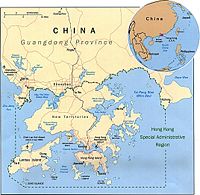


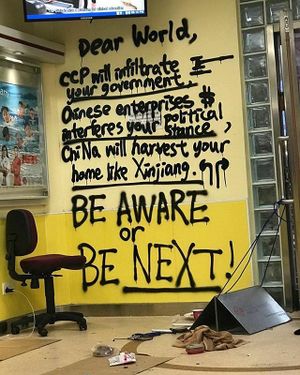
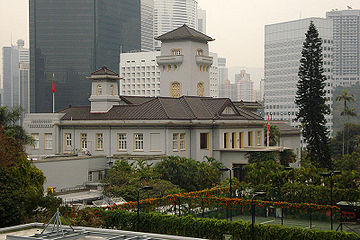

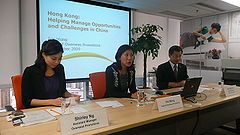
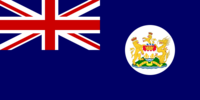
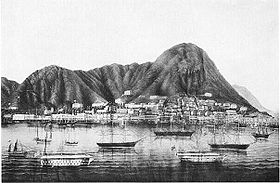
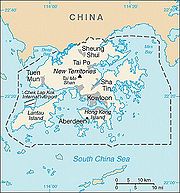
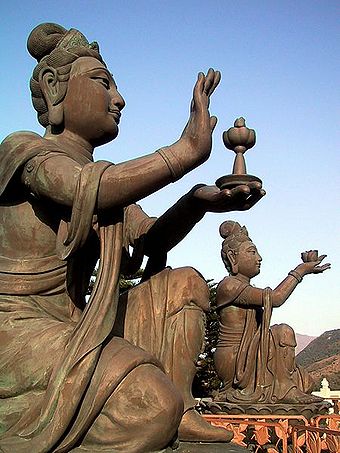

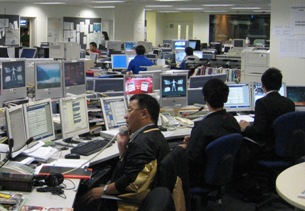
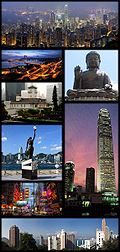
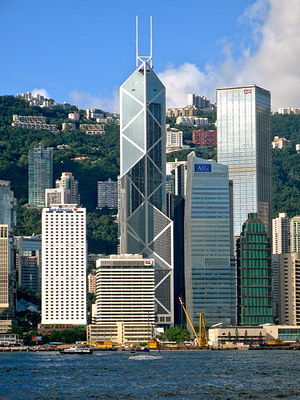
 KSF
KSF